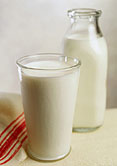- 10 Strategies to Overcome Insomnia
- Could Artificial Sweeteners Be Aging the Brain Faster?
- Techniques for Soothing Your Nervous System
- Does the Water in Your House Smell Funny? Here’s Why
- Can a Daily Dose of Apple Cider Vinegar Actually Aid Weight Loss?
- 6 Health Beverages That Can Actually Spike Your Blood Sugar
- Treatment Options for Social Anxiety Disorder
- Understanding the Connection Between Anxiety and Depression
- How Daily Prunes Can Influence Cholesterol and Inflammation
- When to Take B12 for Better Absorption and Energy
Not All Trans Fats Harm the Heart, German Study Contends


For years, trans fats have been viewed as bad for the heart, prompting the U.S. Food and Drug Administration last summer to ban artificial trans fats from food products.
But a new study suggests that not all trans fats are equal, and some might even be good for you.
The German researchers found that naturally occurring trans fats found in dairy and meat products might actually help protect the heart, while low levels of artificial trans fats did not seem to pose a health risk.
“We now show that, at these low levels, industrially produced trans fats are not hazardous to health,” said senior study author Clemens von Schacky, head of preventive cardiology at the University of Munich. “Come to think of it, it is a fairly common phenomenon: Some things are toxic at high levels, but we can live with them at low levels.”
The findings were published in the Sept. 23 issue of the European Heart Journal.
Trans fats have long been considered the worst type of dietary fat, since they have been shown to simultaneously increase “bad” LDL cholesterol and lower “good” HDL cholesterol, according to the American Heart Association.
In June, the FDA gave food manufacturers three years to remove partially hydrogenated oils, American’s primary source of dietary trans fats, from the nation’s food supply.
Alice Lichtenstein is director of Tufts University’s Cardiovascular Nutrition Laboratory and an expert with the American Heart Association. She said the new study, while interesting, does not show that FDA regulators made the wrong call.
“It [the study] certainly raises some important questions that we’ll need to think about, but right now these data do not suggest that in 2015 in the U.S., that we should change our recommendations regarding trans-fatty acids,” Lichtenstein said. “The overwhelming amount of scientific evidence supports that decision.”
Partially hydrogenated oils are created by pumping hydrogen into vegetable oil to make it more solid, and they are used to improve the texture, shelf-life and long-term flavor of processed foods, according to the FDA.
But some trans fats are naturally produced in the gut of some animals, and can be found in the milk and meat derived from these animals, the heart association explains.
In background information, the researchers noted it is well-established that high levels of artificial trans fats in food can lead to high cholesterol, heart problems, stroke and diabetes. They have even been linked to infertility, Alzheimer’s disease and some cancers.
However, few have explored whether low levels of trans fats can be safe for humans, and whether or not there is any difference between artificial and naturally occurring trans fats, von Schacky explained.
For their government-funded study, the researchers measured the concentrations of trans fats found in the membranes of red blood cells in participants in a long-term, ongoing study of about 3,300 heart patients in Germany. During an average follow-up period of just over 10 years, 30 percent of the patients died.
The investigators assessed the total concentrations of trans fats in each patient’s blood, and also sorted out concentrations of artificial versus natural trans fats.
The study found that people with higher levels of naturally occurring trans fats were 37 percent less likely to suffer a sudden cardiac death, compared with those who had low levels of natural trans fats.
“We were surprised to find that naturally occurring trans fats were associated with a lower rate of deaths from any cause, and this was driven mainly by a lower risk of sudden cardiac death,” lead author Dr. Marcus Kleber, a post-doctoral researcher at the Vth Department of Medicine of the Medical Faculty Mannheim at Heidelberg University, said in a statement.
However, the study was not designed to prove a cause-and-effect link between the two.
At the same time, the researchers found that increased levels of artificial trans fats did not appear to increase a person’s risk of death.
There is a catch, though — the Germans in the study had levels of trans fats that were much lower than those typically found in Americans.
Trans fats in the blood of the German study participants averaged just under 1 percent. By comparison, a recent study in the United States found that Americans have a 2.6 percent concentration of trans fats, on average, the study authors pointed out.
Von Schacky said Germans’ low levels allowed researchers to properly assess the safety of small amounts of trans fat in people.
“You could not have done the study we did in the U.S.,” he said. “However, in Germany, levels of industrially produced trans fats were low already years ago. Therefore, we could find out what that means.”
But Lichtenstein said that the low trans fat levels in Germans may have skewed the study’s results, since the researchers couldn’t assess the effects of very large amounts of trans fats.
“They may not have the range of intakes necessary to properly test the connection,” she said.
The low levels of trans fats in Germans might also point to other fundamental differences between Germans and Americans that would affect the results, including weight, smoking and other heart risk factors, Lichtenstein added.
More information
Visit the American Heart Association for more on trans fats.
Source: HealthDay
Copyright © 2026 HealthDay. All rights reserved.










